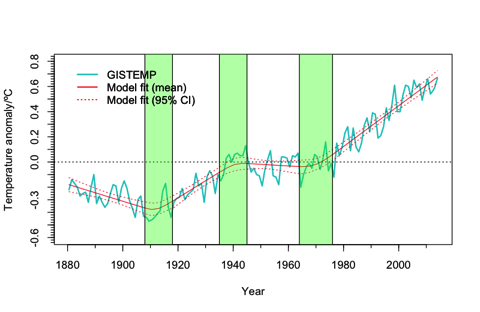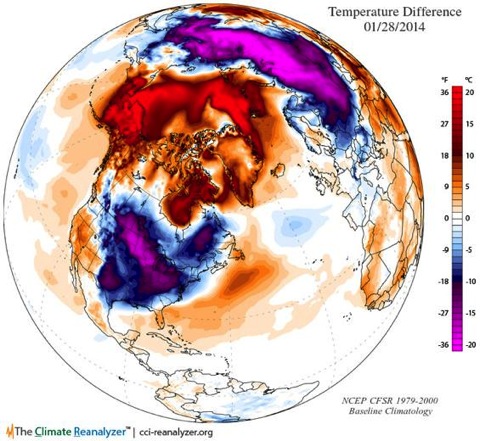 RealClimate has given James Randerson, editor of the Guardian’s environmental website, the opportunity to respond to two RealClimate posts on the Guardian’s “investigation” into the hacked CRU emails. I found his response disappointing. He points to the Guardian’s climate change credentials. They are certainly for the most part good, though in view of the overwhelming scientific evidence that ought not to be remarkable in a newspaper pitched to an educated readership. However in this time of intellectual chaos in the media’s relationship to science we have to be thankful for what we ought to be able to take for granted.
RealClimate has given James Randerson, editor of the Guardian’s environmental website, the opportunity to respond to two RealClimate posts on the Guardian’s “investigation” into the hacked CRU emails. I found his response disappointing. He points to the Guardian’s climate change credentials. They are certainly for the most part good, though in view of the overwhelming scientific evidence that ought not to be remarkable in a newspaper pitched to an educated readership. However in this time of intellectual chaos in the media’s relationship to science we have to be thankful for what we ought to be able to take for granted.
But Randerson doesn’t seem to comprehend that the series of Fred Pearce’s articles on the emails frequently fell far short of the journalistic standards the Guardian normally sets. He speaks of the strong public demand for an in-depth journalistic account of what the emails tell us about how climate scientists operate, and paints the Guardian’s response as unparalleled.
“No other media organisation has come close to producing such a comprehensive and carefully researched attempt to get to the bottom of the emails affair.”
I wrote about one of those “carefully researched” articles here on Hot Topic. On the sketchiest of evidence, and a prejudiced reading at that, it managed to imply that Phil Jones and Michael Mann were guilty of improper behaviour, damaging to the publication of scientific papers.
Randerson goes on to provide a justification for the exercise:
“…only by looking thoroughly under every rock can those of us pressing for action on climate change maintain with confidence that the scientific case remains sound. Fred’s investigation shows that confidence is indeed well placed…”
Thank you Fred, but we knew that already. Why, along the way to this conclusion, did you feel the need to throw doubt on the integrity of some of the scientists doing the work? Well, says Randerson, there were “troubling issues” in the emails, and if you can’t see that there’s something wrong with you:
“… but to claim that the emails do not throw up some troubling issues looks like the inward-looking mentality that is sometimes (perhaps understandably) expressed in the emails themselves.”
Randerson then claims four significant results from the Guardian investigation. One is the matter of the siting of Chinese rural weather stations that figured in a paper Jones wrote in 1990 (twenty years ago!). It’s a complicated story, which I won’t try to retell here, but Jones has since said that he now realises that some of the stations had moved their sites and that he would think about the possibility of submitting a correction.
Randerson claims credit:
“To our knowledge, no other media organisation or blogger had used the emails to shed light on the controversy over the 1990 paper so a correction would not be on the table without the Pearce investigation.”
Randerson’s second claim also relates to the same highly damaging article on the China temperature data, in which Pearce wrote:
“It also further calls into question the integrity of the scientist at the centre of the scandal over hacked climate emails, the director of the University of East Anglia’s Climatic Research Unit (CRU), Dr Phil Jones. The emails suggest that he helped to cover up flaws in temperature data from China that underpinned his research on the strength of recent global warming.”
Randerson doesn’t reassert this, but denies that they were supporting the climate sceptic Douglas Keenan in their pursuit of the question. They weren’t in as many words, but in terms of the general tone of the article most readers could have been forgiven for thinking they were.
His third claim is that in spite of having made three corrections to their original article on the hockey stick graph this did not change the main point the article was making, which was that in 1999, Mann’s hockey-stick reconstruction was the subject of intense academic debate amongst climate scientists. When I first read the article it seemed a good deal more slanted than that. The sub-heading reads: “Pioneering graph used by IPCC to illustrate a compelling story of man-made climate change raises questions about transparency.”
Randerson’s final claim related to the Freedom of Information Act, which he describes as a serious issue worthy of discussion and debate. So it is, provided the discussion includes the fact that the requests for information were clearly orchestrated and overwhelming in their demands. That deniers’ tactic has obviously spread to the US. In a recent email James Hansen writes:
“We are continually burdened by sweeping FOIA (Freedom of Information Act) requests, which reduce our ability to do science and write it up (perhaps this is their main objective), a waste of tax-payer money. Our analyses are freely available on the GISS web site as is the computer program used to carry out the analysis and the data sets that go into the program…
“The material that we supplied to some recent FOIA requests was promptly posted on a website, and within minutes after that posting someone found that one of the e-mails included information about how to access Makiko Sato’s password-protected research directory on the GISS website…Within 90 minutes, and before anyone else who saw this password information thought it worth reporting to GISS staff, most if not all of the material in Makiko’s directory was purloined by someone using automated “web harvesting” software and re-posted elsewhere on the web. The primary material consisted of numerous drafts of webpage graphics and article figures made in recent years.
“It seems that a primary objective of the FOIA requestors and the “harvesters” is discussions that they can snip and quote out of context.”
Back to Randerson on RealClimate. He considers that by inviting comment from qualified people on the email articles the Guardian has succeeded in creating a definitive account of the emails and the intention is to expand it into a book.
“This represents an extraordinary commitment to transparency that we believe is unique in journalism. What other news organisation would open itself to direct criticism in this way including, for example, annotations that read “this is absolutely false” and “this is really bad”?
The best thing the Guardian could now do is to reflect that those annotations may well be the correct verdict and let the idea of a book quietly die.
Like this:
Like Loading...



 RealClimate has given James Randerson, editor of the Guardian’s environmental website, the opportunity to
RealClimate has given James Randerson, editor of the Guardian’s environmental website, the opportunity to  The second section of the Copenhagen
The second section of the Copenhagen